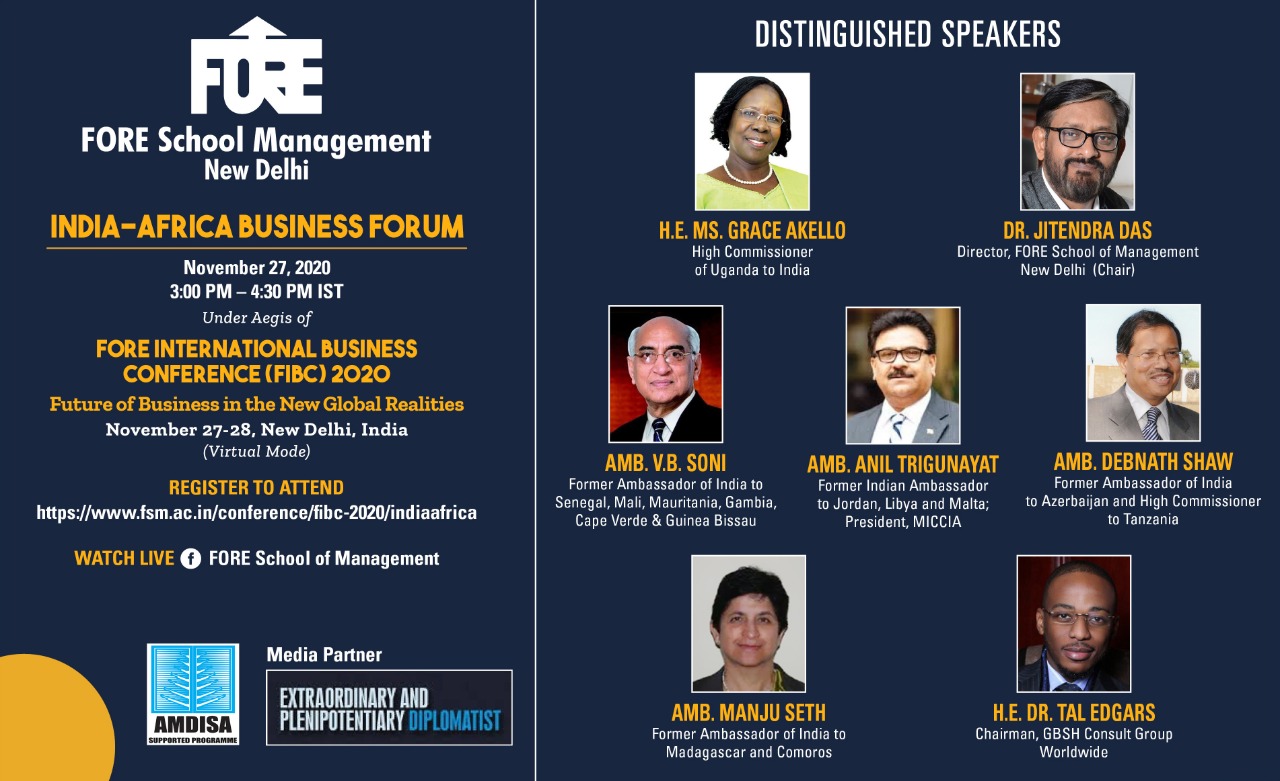India-Africa Business Forum
Under The aegis ofFORE International Business Conference (FIBC) 2020
[IN VIRTUAL MODE]
November 27, 2020 at 3:00 PM to 4:30 PM

[IN VIRTUAL MODE]
November 27, 2020 at 3:00 PM to 4:30 PM

Covid-19 has brought with itself new geopolitical and economic realities. The business environment is also changing drastically with increasing reliance on technology. From the supply chain disruptions to the constraints in international mobility of people and goods, businesses across the world have been affected.
Africa too is facing these challenges, and is seeking pragmatic solutions. The challenges are manifold and they are related to agricultural, manufacturing, services, food security, regional and global value chains, human resource management, and, technological development, among others.
Today, African leaders are looking forward to solution-centric approaches. Africa is keen to revive its economies, increase export competitiveness, and boost their global outreach. This not only applies to those countries which rely heavily on comparative advantages in extractive industries e.g. oil or minerals, but also for those countries that have developed competitive advantages in various sectors over the years. Africa is home to 1.3 billion people making up to approximately 16 per cent of the world population.
From the Lagos Plan of Action, through the Abuja Treaty calling for creating the African Economic Community, and to the creation of the African Union, the African leaders have always advocated pragmatic policies for trade, investments and economic integration.
Over the years, socio-economic initiatives like NEPAD and CAADP, and governance frameworks like APRM have helped in bringing transformative changes in the African economic and social life.
Moreover, today, there have been pro-active responses by sub-regional congregations in Africa to address socio-economic challenges emanating from the pandemic. For instance, ECOWAS had started the procurement and supply of medical essentials by early April 2020. SADC and EAC did similar preparedness. SADC made efforts to resolve issues related to movement of goods and trade facilitation. SACU undertook studies to help enhance policy preparedness by understanding the real impact of pandemic.
Overall, the efforts made by African institutions have been exemplary. Moreover, to build a shared future for the people of Africa and India, it is a geo-economic necessity for both entities to collaborate together. This can be envisaged under the Ten Guiding Principles for India-Africa engagement unveiled by the Government of India in 2018.
Given this backdrop, FORE School of Management, New Delhi and The Diplomatist is organising an India-Africa Business Forum on November 27, 2020. This session will be held under the aegis of FORE International Business Conference (FIBC 2020) being organised by FORE School of Management, New Delhi on November 27-28, 2020 (in virtual mode).
The India-Africa Business Forum will comprise of a high-level expert panel of Ambassadors to deliberate on a pragmatic roadmap for African economies, and the way ahead for India-Africa economic and business cooperation in the times of come. Broadly, the Forum aims to address the following pertinent issues, and help the economies enhance their global preparedness for a post-pandemic world: